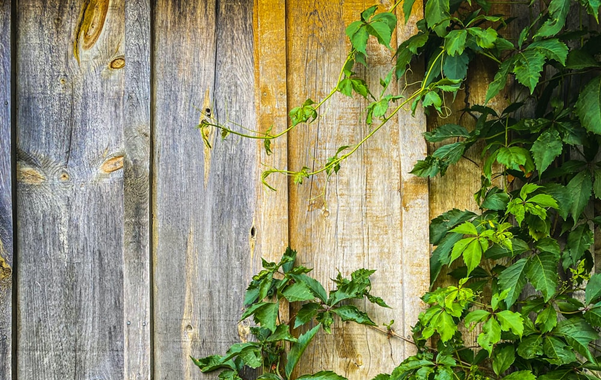Will It Damage My Fence if I Grow a Vine on It?
Climbing plants are a simple way to bring natural beauty to your fence. Plants can give your property a lush look and offer privacy and shade. Vines are an excellent way to add natural foliage as an alluring feature to your fence, but can they cause any damage? Which varieties of climbing plants should be avoided for fences?
With vines, tread with caution. As good as they can look, vines can also be destructive, and they are known to grow quickly and aggressively while causing severe damage to fences. If you’re planning on planting vines, you need to be informed about how to do so safely without compromising the structural integrity of your wall.
Avoid these vines
Not all vines are created equal! Certain species of vines will be destructive to your fence, and those are vines that are fast-growing and invasive and should be avoided at all costs.
Invasive vines are very misleading – what looks like a small, attractive plant will quickly domineer its way through your entire garden, causing you to fight a continuous battle with the vine. Vines like this have been known to take over entire regions and gardens. Once they’ve got their hooks in, the only way to get rid of them is to burn or poison them, which will damage your other plants and fence. Invasive types are often related to native species of plants and include English ivy, Chinese wisteria, and Algerian ivy.
What types of vines are ok?
Tendril vines, which are characterised by growing in spiralling tendrils and clinging to thin objects to support themselves, can be a good option for growing on fences. Clematis is an example of this species.
Twining vines, which twist their stems around thin objects, are another option. Honeysuckle and jasmine are two examples of this type of vine. Despite being fast-growing, they are less likely to get out of control.
You can also opt for annual vines like morning glory or sweet pea, with the cadence being that you remove them at the end of their growing season. These are the safest type of vines for wooden fences, which we’ll elaborate on further in this article.
What type of fence suits a climbing plant?
The material of your fence matters a lot when considering what vine to plant.
Metal and vinyl fences will be able to handle the vines very well, with minimal risk of damage. Vinyl, aluminium, and steel (if the metal is galvanised and quality) are all resistant to rust and the damage that a moisture-trapping vine can do.
A PVC fence is incredibly hardy and can withstand most types of vines. The only downfall you may experience is attracting bugs and the moisture of the vines growing algae on your fence. Algae can easily be cleaned off PVC’s slick surface. Bugs may be a bigger issue – you should research the type of bugs attracted to your derived vine before you plant it.
Wooden fences
Wooden fences, on the other hand, need a bit more consideration. Vines are experts at attracting and trapping in moisture, which can equal disaster for your fence if it accelerates rotting. Vines can also stain your fence. Aggressive species will twist around the individual slats and stretch or warp them, compromising the entire structure. They also attract bugs, which will do more damage to a wooden fence than they would a PVC wall. Bugs can eat at and wear away your fence.
Annual vines are the safest option for wooden fences, as these are far less aggressive and removed after the flowering period. Annual vines have the bonus of being incredibly beautiful, but most of them do not grow large enough to offer that additional privacy and shade other types of vines would.
Other tips for vines
Speak to an expert! It’s always worth consulting a professional. In this case, it’s probably worth talking to both a fence installer and someone who works with plants. They’ll both be able to give you advice specific to your fence and the vines you want to grow.
Research your plants’ needs – some plants need more sunlight than others, some need more space, some need more soil. Ensure you can cater to your vine’s needs so that they don’t shrivel and wilt on your fence.
Consider the maintenance required. Some species require a lot more TLC than others. Make sure you are prepared for the level of care your vines will need.
If you’re afraid to commit to a vine but still love the look of plants against a wall, don’t worry! There are fantastic alternatives. Hanging planters and vertical herb gardens are a unique and great-looking twist to incorporating greenery onto your fence.
For all your fencing queries:
Will vines ruin a fence?,Are vines bad for wood fences?,Can I grow vines on my fence?,What can you grow against a fence?,what plants to hide Colorbond fence?,Which climbing plants that wont damage walls?,how to grow vines on fence,best climbing fruit plants for Australia. Contact Jim’s Fencing Melbourne on 13 15 46.

